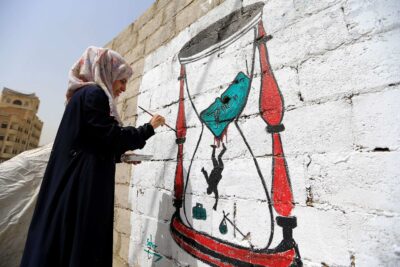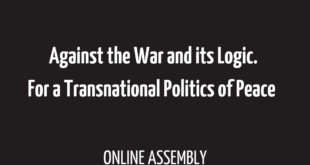→ Originally published in Italian
 ‘Bringing the war home’ was the slogan of the peace movement at the time of the Vietnam War. Today, it is the watchword—albeit with a very different meaning—of European rulers. To them, war should make it possible to govern the disorderly European home in an altogether disorderly world—a world of empires without imperialisms, and transitions without hegemonies. They want to order European societies, where cracks and contradictions in the ailing neoliberal project have been opened up by the pandemic and the ecological crises, by the movements of women and migrants, and by the widespread rejection of precarity as inevitable.
‘Bringing the war home’ was the slogan of the peace movement at the time of the Vietnam War. Today, it is the watchword—albeit with a very different meaning—of European rulers. To them, war should make it possible to govern the disorderly European home in an altogether disorderly world—a world of empires without imperialisms, and transitions without hegemonies. They want to order European societies, where cracks and contradictions in the ailing neoliberal project have been opened up by the pandemic and the ecological crises, by the movements of women and migrants, and by the widespread rejection of precarity as inevitable.
Bringing the war home is the horizon opened up by neoliberal militarism, which seeks to control the conditions of class struggle. It is the armed re-proposition of the old ‘there is no alternative,’ directed against those fighting for a different world. While its focus has shifted from the shaping of markets, its Thatcherite origins still echo menacingly even when it is dressed in high uniform. It is alarming when European leaders suggest that preparing for war is necessary for maintaining peace. At this point, there is still no need to mobilize and arm men and women; instead, militarism aims to implant the idea of war in the minds of those living in Europe and those challenging its borders. Once this idea takes hold, war is expected to prompt an automatic sacrifice for the sake of a higher interest, which is the maintenance of peace—though a peace in which people work as if they were fighting to defend ‘our’ society. The EU’s High Representative for Foreign Policy, Josep Borrell, has made it clear: everyone prefers butter, but if we don’t want to lose butter, we must start producing weapons as soon as possible.
Militarism clearly represents the ideological effect of the ongoing Third World War. This war manifests itself globally with varying degrees of intensity and violence. It strengthens the role of states everywhere, as they renounce any capacity for social mediation. As states wage war, fighting neoliberal militarism means taking the side of the living labor who bears the material burden of the Third World War, whether in Europe or elsewhere. Under this persistently neoliberal regime, the arms race translates into a push for external security without full societal mobilization. Although we are not yet in a war economy, many workers are living in poverty, and are forced to ration basic necessities. Since the outbreak of war in Ukraine, new security policies in Europe and beyond have been increasing the pressure on workers to sacrifice more for a society that offers an increasingly uncertain and precarious future. Militarism serves as the ideological justification for exploiting those who suffer its burden.
At the same time, militarism revives wrecks of the past and allows the once forbidden dreams of the European right, like conscription. But in order to fit into the present, these old wreckages are being repainted. Denmark, for example, is not only reintroducing conscription but extending it to women. Similarly, Ukraine promotes the participation of women and LGBTQ+ people in the war as proof of its adherence to Western freedoms, using this stance to justify its fight against ‘Oriental despotism’. In Poland, the militaristic fervor has led to the integration of 30,000 recruits from the Territorial Defense Forces—essentially paramilitary groups—into the army. The Baltic states are also pushing to extend conscription to all NATO countries. These examples are not simply aesthetic warmongering operations but tangible signs of a serious threat, which was confirmed by Macron’s suggestion about the possibility of sending NATO troops to Ukraine. Conscription points to a future of actual war. It is a school of social obedience. Meanwhile, universities affirm the need for dual use in research and knowledge, making war a necessary condition for prosperity. However, the recent emphasis on conscription recognizes the continuing importance of human involvement in war alongside technological advances; drones cannot fully replace the role of human soldiers—flesh and blood, men and women—on the battlefield. States wage war, and to wage war they need lives as resources to consume. Fighting militarism, then, literally means preventing living labor from becoming dead labor.
Militarism expresses a complex interplay between old and new neoliberal dynamics, as it is both a response to and a symptom of its own crisis. That is to say, militarism goes beyond being a strategic ploy for capital to move towards the new frontiers of war accumulation. We no longer live in the age of imperialism but in an unmanageable transnational space beyond the ultimate control of both states and capitalists, entangled as they are in multiple transnational contingencies. Whether it is Putin’s invasion, the Houthi attacks, or the migrations fueled by these wars, it is clear that, for fractions of capital, business will continue even in this chaos. However, these operations now navigate a landscape marked by contingency and unpredictability, often transcending the logic of profit. Contingency, unpredictability, and lack of control are the most visible signs of the crisis we have long been calling the Third World War.
Militarism is more than a mere benefit for the arms industry; it is a strategic response aimed at restoring order in a Europe at war, while directly facing its crisis. It reshapes social relations and integrates them into a looming war scenario that hangs over Western Europe like a constant, spectral threat. Militarism embodies the fetishism of war, which shapes individual and collective expectations into forms of acceptance, renunciation, and sacrifice. It narrows the spaces for political mediation while imposing industrialization policies such as the European Defense Industrial Strategy. This strategy mobilizes EU funds diverted from post-Covid recovery to transform the continent back into a manufacturing hub for the present. Militarism also legitimizes the recruitment of industry and the management of university research in the interests of business, creating a new military-industrial-academic complex with massive funding unprecedented since the Cold War era. It’s not enough to say that Europe is preparing for war. Europe is at war.
Militarism consolidates control over society; it narrows spaces for action while silencing the contradictions that have emerged from the pandemic and climate crises. It creates a framework that prioritizes profit and obedience. While the green transition may not be completely transformed into a military one, its color tends towards camouflage, army green. The downward re-modulation of green initiatives—visible in agriculture, industry, and private consumption—is justified in the name of arming Europe, a supposed necessity. Because it embeds social relations in a framework of war, militarism is increasingly aggressive towards those who try to escape these social constraints. This affects migrants, as seen in the recent European agreement with Egypt, which guarantees their ‘right’ to stay ‘in their place’—a mock ‘right’ guaranteed in Europe by residence permits. It also affects women, as militarism cuts social spending, resulting in an additional burden of reproductive labor, care, and defense—including military—for societies teetering on the brink of war.
By bringing the war home, militarism seeks to address the crises shaking Europe but faces widespread reluctance to conform to the outdated roles of war heroes. An even deeper reluctance will be found among the ‘wretched’ of the banlieues in France and across Europe. After all, beyond a defensive appeal to ‘our way of life,’ neoliberal militarism no longer has resources or rights to offer. In other terms, its call for war has no promises and no future. Rather, it is a war for the present, in which sacrifice is immediately valued in monetary terms in order to survive or to avoid falling into a horizon of misery. Today, militarism is reactive. It couldn’t be otherwise, especially since its companion—nationalism—seems incapable of producing the mobilizations of the last century, despite its constant reaffirmation. This rings particularly true in regions where war mobilization is not just a specter but a reality, such as along the Russian borders, where Putin is offering citizenship to Kyrgyz and Indian nationals in exchange for military service. However, even citizenship today is hardly a fair exchange for donning a uniform, especially since it no longer serves as a tool for social integration and upward mobility but rather as a passport to move to a world in which borders are increasingly difficult to cross. Finally, religious fanaticism itself no longer pays as it once did, if ISIS-K had to pay 5000 euros per fighter to recruit the Moscow attackers.
In this context, it is time to make peace effective against war. It is time to actively build and practice internationalism, understanding that limiting our efforts to local resistance is not sufficient in the transnational context that shapes our daily reality. Our transnational politics of peace, which we have been developing for a long time together with many others in the Permanent Assembly against War, is a rejection of the logic of fronts and blocs. Instead, it seeks to create processes and pathways across these divisions, even in situations where only one side bears the consequences of war—the only side it is right and necessary to stand with. Supporting the Palestinian men and women enduring Israel’s brutal ethnic cleansing in Gaza and the West Bank, however, does not equate with endorsing social projects that are the exact opposite of what we support every day. We do not need to romanticize war with capital letters or fetishize its aspects; rather, we need to challenge the cycle of violence, bloodshed, exploitation, and oppression inflicted on those affected by war. It is time to reject the idea that war should be the model for every struggle, conflict, or opposition, as this mindset ultimately legitimizes militarism. Instead, we must put an end to militarism altogether.
It has been just over a month since March 8th, when women around the world took to the streets to say no to a war that asks them to be the warriors and mothers of the state, or worse, the targets of conquest and violence. Since October, massive protests have spread worldwide to condemn the genocide, while in Israel the protests against Netanyahu have grown into a movement openly challenging the territorial occupation and the killing of Palestinians by the IDF. Meanwhile, schools and universities are now experiencing mobilizations unseen in recent years, with occupations and demonstrations.
At the same time, a transnational politics of peace cannot focus on just one war. The militarism gripping Europe shows that Gaza and Ukraine are part of the same conflict. There is only one war going on—the Third World War, which is spreading across the Middle East, the Red Sea, and Eastern Europe. It affects migrants, women, and the living labor that resists becoming dead labor and rejects the logic of war and sacrifice. The Third World War is not only a European issue; still, Europe plays a prominent political role in the war, which cannot be ignored. We must fight against this war by gathering the strength of those who—beyond national borders—reject the deadly logic of militarism and refuse to die for the glory or profit of others—of those who are actively pursuing projects of struggle and peace in their daily lives.
 ∫connessioniprecarie connettere gli ∫connessi, produrre comunicazione
∫connessioniprecarie connettere gli ∫connessi, produrre comunicazione




